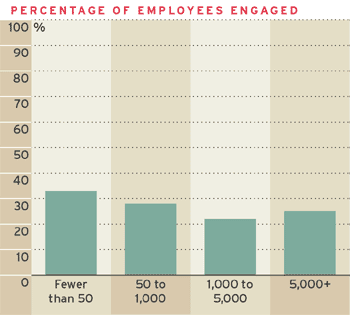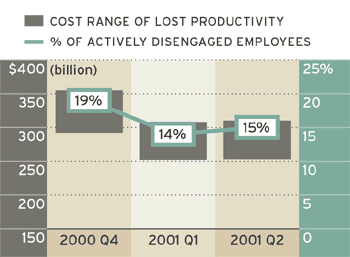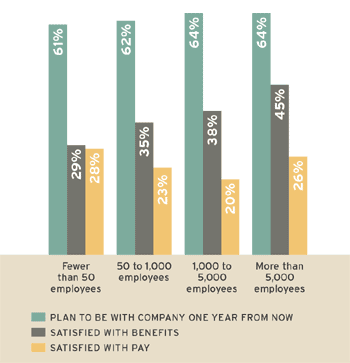In their drive to dominate a sector or industry, executives often go for all-out growth. But the strategy has a downside: As a company's workforce grows, employees become less engaged, a decline that has implications for the bottom line.
Gallup has measured engagement for employees at small and large companies for the past three quarters. The key findings: Engagement, a feeling of being fully involved in one's job, is highest (33% of employees) at companies with fewer than 50 workers. Engagement is lowest (22%) at companies with 1,000 to 5,000 employees. Even more disturbing: At companies with 1,000 to 5,000 employees, 19% feel actively disengaged -- or fundamentally disconnected from their work vs. 12% at companies with fewer than 50 workers.
Engagement is crucial because it bolsters productivity. Gallup estimates that if a company with 5,000 employees could match the engagement level of a company with fewer than 50 workers, its productivity would increase by $3.24 million a year. Moreover, the value of creating a small-company feel increases proportionally with staff size. For example, if a 20,000-person workforce were as engaged as a 49-person workforce, its productivity gain would add as much as $12.96 million a year.
Gallup researchers trace the higher engagement of small-company employees to their greater sense of "local control," the feeling of connection to, and accountability for, company output. But at large companies, hierarchy and bureaucracy can make employees feel their contributions don't matter.
To replicate the local control of small companies, managers at large companies should bear in mind that some work units within an organization can be engaged at the small-company level. In work units of fewer than 10 people, however, engagement will soar or plummet depending on the manager. That's because in small groups each member keenly feels a good manager's ability to communicate and motivate -- and a bad manager's incompetence. So, if you expect your small teams to be top-performing, make sure your managers are up to the challenge.
|
|
 |
| THE COST OF DISENGAGEMENT |
|
 |
| Results of this survey are based on a nationally representative sample of about 1,000 employed adults aged 18 and older. Interviews conducted by telephone during October 2000 - May 2001 by The Gallup Organization. For results based on samples of this size, one can say with 95% confidence that the error attributable to sampling and other random effects could be plus or minus three percentage points. For findings based on subgroups, the sampling error would be greater. |
|


